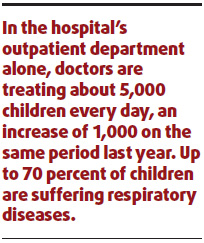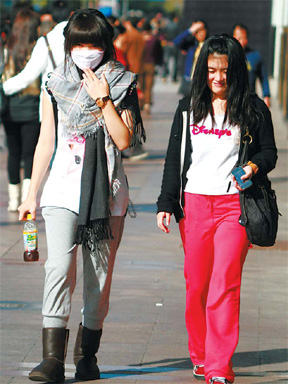Youths worst hit by H1N1
Children and teenagers are the hardest hit from a spike in A(H1N1) flu cases across the capital, doctors say.
The Beijing Center for Disease Prevention and Control said the number of people suffering H1N1 had risen 12 percent to 5,851 in the past week.
Patients aged between 10 and 20 accounted for 62 percent of total cases.
|
Autumn is expected to exceed 55 days this year, the longest in nine years. Feng Yongbin |
The bureau said about 52.1 percent of the total flu patients in Beijing are suffering from H1N1, and the remainder have contracted seasonal influenza.
In Beijing Children's Hospital, doctors are treating about 8,000 patients every day.
"Seasonal changes often cause colds, which usually happen during the fall and winter," said Dong Lijuan, a doctor at Beijing Children Hospital. "Meanwhile, colds are more prevalent among children because of their lack of resistance to infection."
In the hospital's outpatient department alone, doctors are treating about 5,000 children every day, an increase of 1,000 on the same period last year. Up to 70 percent of children are suffering respiratory diseases.
Mother Liu Baohua said: "My son has run a fever for three days. We came here as early as 7 am, but doctors still have not finished their checks because there are too many people waiting here."
Zhang Yan, a mother of a 9-year-old boy, said yesterday: "My son's school organized a vaccination one week ago, but there are many children who still developed a fever. In his class, there are at least ten cases of colds."
"This morning, the teacher sent mobile messages to students' parents saying the class was suspended, so parents took the children to see doctors here," she said.
Zhao Chengsong, a doctor in the outpatients department of the hospital, said: "The seasonal variation prompts people to spend more time indoors and that increases the chances of viruses spreading from person to person."
"Now many medical staff have postponed their annual leave to help meet the urgent need. They will be on 24-hour duty to give medical service to patients," he said.

In response to the spike in flu patients, health authorities have launched a new campaign to prevent the widespread of H1N1 flu at schools.
Under the campaign, all schools are required to carry out daily health inspections, and the class should be closed when two H1N1 flu cases are reported within two weeks. Students who show flu-like symptoms at home or school should be sent to hospitals immediately.
In addition, people who suspect they have contracted the virus are urged to go to hospital to receive treatment and reduce the chance of infection among other people.
Meanwhile, more medicines and medical facilities will be sent to local community hospitals and health service stations to help cope with demand.
(China Daily 10/28/2009 page25)













